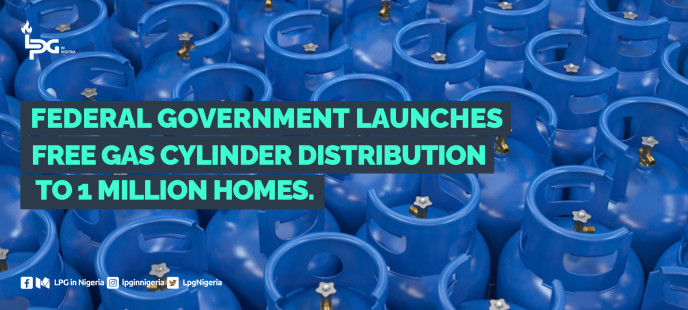- 4369
- 0
Sharing Ideas and Updates on LPG in Nigeria and related information to enable effective collaboration within the LPG Value Chain
Federal Government Launches Free Gas Cylinder Distribution To 1 Million Homes

In a significant move to promote cleaner cooking fuels, the Federal Government of Nigeria has begun distributing free gas cylinders to one million homes nationwide. This initiative aims to reduce the reliance on firewood, cooking stoves, and other harmful cooking fuels.
A Milestone in Cleaner Energy
At the launch event in Abuja, implemented through the 'Decade of Gas' secretariat in partnership with private sector entities Smart Gas, Dr. Yinka Okpeke and A4E, Minister of State for Petroleum Resources (Gas), Ekperikpe Ekpo, emphasized the importance of this milestone. He highlighted that the Liquefied Petroleum Gas (LPG) penetration and bottle distribution programme is part of the administration’s strategy to boost domestic gas use.
“We’re not only introducing a programme today, but we’re also on a mission to change millions of Nigerians’ lives across our six geographical zones. By 2030, we aim to convert 250,000 houses a year to clean cooking gas, which is a lofty but attainable target,” Ekpo stated.
Benefits of the Transition
Ekpo explained that transitioning to LPG is crucial for reducing over-reliance on solid fuels such as firewood, kerosene, and charcoal, which have long been primary energy sources for many households. He stressed the severe consequences of using these traditional fuels, including deforestation, environmental degradation, and significant health impacts from indoor air pollution.
“In order to ensure a cleaner environment, enhance public health, and promote sustainable development, we must encourage the usage and adoption of LPG,” he added. The initiative also signals progress towards improving women’s inclusion and providing employment opportunities for the youth, as women are disproportionately affected by the health impacts of traditional cooking methods.
Empowering Women and Youth
Coordinating Director of the Decade of Gas Programme, Mr. Ed Ubong, noted that empowering women and youths is a major component of the programme. The plan involves distributing over a million gas cylinders to homes, focusing on women in rural areas. This effort aligns with President Bola Tinubu’s vision of ‘Gas to Prosperity and Renewed Hope.’
Ubong elaborated, “Today we will move about a thousand cylinders here in Abuja. It’s funded by the private sector. The gas is being filled for free. The training will be done for free.” He also highlighted the collaboration with local council representatives and the Smart Gas team to ensure the cooking gas facilities reach the intended recipients.
Health and Economic Benefits
Minister of Youth Development, Jamila Ibrahim, emphasized that LPG usage significantly reduces respiratory illnesses, providing life-changing health benefits for many Nigerian families. She also mentioned a World Bank report estimating that widespread LPG adoption in Nigeria could save the nation over $5 billion annually in healthcare costs.
Chief Executive of the Nigerian Midstream and Downstream Petroleum Regulatory Authority (NMDPRA), Farouk Ahmed, noted that one of the main barriers to LPG adoption has been the cost of cylinders and initial equipment. He expressed optimism that the government’s efforts are helping to remove these barriers, particularly for women.
Support and Participation
The event was attended by several key figures, including the Minister of Women Affairs, Uju Kennedy-Ohanenye; Permanent Secretary, Ministry of Petroleum, Nicholas Ella; Chief Executive of Smart Gas, Dr. Yinka Opeke; Executive Director of Midstream Fund, Oluwole Adama; and CEO of A4E, Oga Adejo-Ogiri.
This groundbreaking initiative marks a significant step towards cleaner energy use in Nigeria, promising improved public health, environmental sustainability, and economic empowerment for countless households.
Source: This Day News.
















0 Comment.